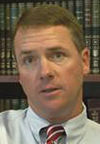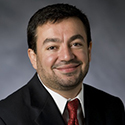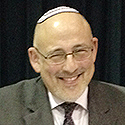By Jeff Brumley
Interfaith dialogue is about much more than symbolism, say those committed to the process.
That’s because effective interfaith conversations require relationships, and relationships require more than annual prayer breakfasts or worship services that rotate among churches, mosques and synagogues ever year.
 “I think it’s longterm relationships that expose the challenging parts of interfaith work,” said Kyle Reese, pastor at Hendricks Avenue Baptist Church in Jacksonville, Fla.
“I think it’s longterm relationships that expose the challenging parts of interfaith work,” said Kyle Reese, pastor at Hendricks Avenue Baptist Church in Jacksonville, Fla.
Reese made the observation shortly before the Dec. 4 “Table of Abraham” in Jacksonville. The twice-a-year event facilitates engagements among the city’s Christians, Jews and Muslims through fellowship and by tackling the sometimes difficult issues that divide them. Most of its participants also participate in intimate gatherings throughout the year across the city.
Reese said long nights over many years have been challening but rewarding.
“You can hold a two-hour event once a year or even build a Habitat [for Humanity] house, but it’s struggling through the difficult parts that brings the growth,” Reese said.
‘What a dysfunctional family’
The Dec. 4 event at the Jacksonville Jewish Center offered the 100-plus in attendance plenty to grapple with.
There were light moments, too.
Panelist Abdullah Antepli, the Muslim panelist, elicited laughter after observing the panel was made up of a pastor, a rabbi and an imam. “We should find a bar to walk into.”
But then Antepli, the chief representative of Muslim Affairs at Duke University, took issue with the title of the event.
“Table of Abraham,” he said, is flawed because it places too much emphasis on the role of males in religious history.
 Antepli said he also dislikes referring to Christianity, Islam and Judaism as the “Abrahamic faiths.” The term is arrogant, sexist and patriarchal, he said.
Antepli said he also dislikes referring to Christianity, Islam and Judaism as the “Abrahamic faiths.” The term is arrogant, sexist and patriarchal, he said.
And think what the members of other religions must think of the Abrahamic traditions when members of those traditions misbehave, he added.
“Boy, what a dysfunctional family,” he said.
Until a better term can be developed, Antepli suggested adding the names of biblical women to the title.
Evolving understanding of God?
Antepli was the third of the three speakers to address the audience of more than 100. Their assigned topic was the understanding and practice of mercy and compassion in the three religions.
The first to speak was Jonathan Lubliner, senior rabbi at the Jacksonville Jewish Center, which hosted the event. His opening remarks included a rebuke for Christians, Jews and Muslims.
“There are times when compassion is not on the table for each of our religions,” he said.
The understanding of mercy has evolved in Judaism, he said. It begins in Scripture with a view that God’s punishment is swift and extends to the children of those who sinned. The emphasis in later passages and rabbincal writings is on God’s patience and forgiveness.
Lubliner suggested that may have resulted from increasingly mature ways of viewing God through the centuries.
 “Perhaps our understanding of God has evolved,” just as our understanding of our parents evolves from childhood to adulthood, Lubliner said.
“Perhaps our understanding of God has evolved,” just as our understanding of our parents evolves from childhood to adulthood, Lubliner said.
Reese then spoke about the Parable of the Good Samaritan in the Gospel of Luke. The story has come to be associated with doing good deeds, and has even generated laws of the same name, Reese said.
But it is a radical challenge to its readers in a number of ways. It should push Christians to widen the definition of “neighbor” and it suggests that the most religiously observant are not always the most merciful.
Reese said the parable also makes clear that practicing mercy should not be considered merely an option.
“Mercy and compassion are not a choice but a gift … so we must extend it to those around us,” he said.
Speaking about mercy isn’t always going to be warm and fuzzy, Antepli said during his remarks.
“The spirit of our conversation has to be honesty, not just feel-good issues.”
Today that means being honest about the lack of mercy exhibited by some Muslims.
“Our struggle is to face that,” he said.
Other faiths struggle with it, too, leaving human beings with the challenge to pattern themselves after God’s mercy and compassion.
For Muslims, that means trying to emulate the Quran’s depiction of God’s mercy overcoming God’s judgment.
“God’s mercy far exceeds human mercy,” Antepli said. “So we must follow this pattern.”
‘In the eye of the beholder’
The discussion didn’t get any easier during the question-and-answer session.
The panelists were asked a number of hard-ball questions, including how to balance God’s call for mercy with the need of victims for justice. For example, should a person of faith want mercy or justice in the case of the police officer killing of Michael Brown in Ferguson, Mo.
Lubliner said the Ferguson situation pushes people of faith to explore both what it must be like to be a young black man in America — and what it’s like to be a cop in America.
Reese added that such situations are complex and Christians must avoid making snap decisions about them.
“Justice requires time and truth-telling and solving and addressing complex issues,” Reese said.
Another questioner asked Reese to explain the most challenging part of the Good Samaritan story — that the two characters most likely to have helped — the priests — were unwilling to do so despite being the most religious.
“And it’s not only about being merciful,” he added. “It says your neighbor is not only your own kind.”
 Presbyterian minister Stephen Kolderup thanked panelists for their willingness to work through a long evening of difficult topics.
Presbyterian minister Stephen Kolderup thanked panelists for their willingness to work through a long evening of difficult topics.
That’s exactly what it takes to create and sustain healthy interfaith relationships, said Kolderup, interim pastor at South Jacksonville Presbyterian Church.
“Thank you for affirming that model,” he said. “I knew it existed, but I hadn’t seen it before.”
